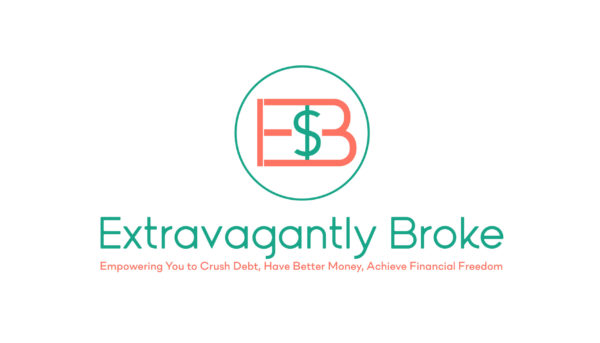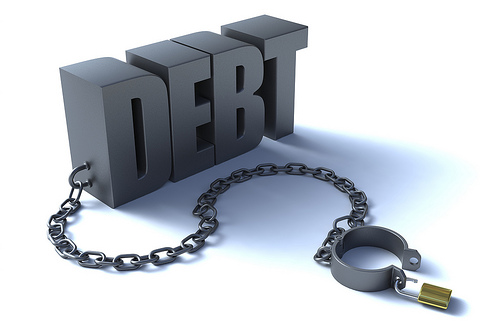Aren’t you tired of being broke all the time?
And feeling like you’re in a never-ending battle to hang onto your money? Don’t you wish you could keep more of your paycheck in your pocket?
And are you baffled at how quickly your money seems to disappear? And often left wondering, where does it all go anyway? Why is it never enough? And how you can stop bleeding cash?
You’ve probably heard the advice a million times. That the way to save money is to create a budget, cut your expenses, and only buy the necessities…blah, blah, blah!
That’s all solid advice. But you’ve tried those things. And nothing works!
Seriously, you work long hours at a job you may or may not enjoy. You try your best to make smart money choices and keep your head above water. And just when you begin to see the light at the end of the debt tunnel — WHAM!
Something comes along and blows your budget sky high!
That’s when your blood starts to boil. And you can almost feel the steam coming out of your ears. You clench your fist and slam it down on the nearest hard surface. Then you find yourself yelling out, “UGH, I JUST CAN’T CATCH A BREAK?”
Before you know it, you’re back to being broke — again! It’s like outside forces are working against you and dragging you down.
I know the feeling!
But why does every day have to be a dogfight to hold on to our cash? Well, the answer might surprise you. And it’s all about…
Table of Contents
Money Manipulation

Think for a moment. What makes you chose to buy certain things?
Of course, we all like to believe that we are independent thinkers and use our intellect to make financial decisions. But surprisingly, we may not be as in control of our spending as we think.
Now consider this! Did you know that mental chains could be preventing you from making progress with your finances?
There are psychological debt chains that squeeze your money tighter and tighter. And pull you down deeper and deeper into what seems like an inescapable pit of I-O-Us.
And all you can do is painfully watch as the light of financial freedom moves further and further out of view.
Worst of all, these debt chains influence us on a daily basis. Their purpose is to turn us all into mindless spending drones, that buy things even when we know we shouldn’t.
You may be wondering, how?
It’s simple. People are being systematically seduced every day into spending away their hard earned cash. And it’s so creatively deceptive that we often accept it without question.
So, what are these insidious debt chains? How do they negatively influence your purchasing habits? And how can you break their vicious hold on your money?
I’ll explain. But be aware, that we are the final decision makers. And we have to shoulder the consequences of our choices. Because ultimately:
We forge the chains we wear in life ~ Charles Dickens
So let’s start with:
The Subliminal Debt Chain

Photo Nick Youngson CC BY-SA 3.0 Alpha Stock Images The BlueDiamondGallery
Believe it or not, but you’ve been living under a state of mind-control!
And what’s worse, it’s not even subtle. In fact, it’s downright blatant!
It’s all done in an attempt to separate you from your cash. But, it’s not taken by force. Instead, you’re giving it away willingly, like an involuntary reflex.
Because even as children we are programmed on a daily basis to spend money. The truth is, we let advertisers, marketers, and businesses tell us when to buy, what to buy, and how much to pay.
And we’re bombarded from every angle. It’s on our smartphones, TVs, tablets, and laptops. It’s in HD, and 3D, and 4G — oh my!
Just think about all the encounters you’ve already had today. Like the commercial with the close-up shot of a juicy, mouth-watering burger. Sitting alongside a pack of crispy, perfectly golden french fries.
And, don’t forget the refreshing ice-cold drink to wash it all down. Mmmm, hungry yet?
Or, the Ad with the super hot celebrities flexing their muscles or flaunting their curves. All while spraying on a particular fragrance. Can’t you just smell the sexiness?
So of course, buying that fragrance will make us all look just as amazing, right? Yeah, right!
Advertising is meant to be fun, engaging, and entertaining. It plays on your emotions, weaknesses, and desires. And it makes you feel happy, sad or sentimental. All so you can connect with the product and believe that you must have it.
But, don’t be fooled! It’s not about entertainment. It’s all about mind-control!
The actual goal is to send you subliminal messages, that work to relieve you of as much of your money as possible. All while keeping their bank accounts fat, and your pockets empty.
Fortunately, you can break this chain of psychological trickery. So what’s the solution?
The Debt Chain Breaker is Awareness
Advertisers attempt to create powerful feelings in viewers. Then they try to capitalize on those emotions. If a commercial makes us feel good, then we associate good feelings with the product.
But, maybe you don’t need it. Or, you may not even have the extra cash for it. Yet, somehow you seem compelled to buy it anyway. Why? Because of the intense emotional connection you’ve formed due to advertising.
However, it is possible to avoid manipulation from those marketing mind tricks. And here’s how:
- Think about the reason before you buy.
- Are you motivated by necessity? Meaning that, is the product crucial to your well-being, right now in your life? And, do you have the funds prepared and available so it won’t break your budget?
- If both answers are “yes,” then go for it! If either answer is “no,” then pass on it for now.
- Is your desire artificial? In other words, is your motivation to buy being created by an external source, such as a cool commercial.
- If this is the case, then keep in mind that those superficial emotions will fade if given a little time.
- Give yourself at least a 48 hour grace period before buying.
- It allows you more time to process the idea of buying something new.
- And you may even realize that you don’t need that product after all.
- It also provides you with more opportunity to consider whether the purchase will have any negative impact on your finances.
- But, if you are too easily tempted, then you should mute, fast forward, or ignore ads as much as humanly possible. Don’t let your FOMO (fear of missing out) affect your cash flow!
We must use our Awareness and logic to separate the enjoyment of a good advertisement, from the actions of buying. In other words, take the emotion out of the spending.
I’m sure you’ve heard that Knowledge is power? And that when you know better, you can do better. So be mindful of what’s happening and don’t fall into the mindless spending trap.
It’s okay to laugh, cry, and cheer with your favorite commercials, but never forget your real money goals. And always keep your guard up against deceptive marketing tactics.
So remember:
If you don’t control your mind, someone else will ~ John Allston
The Obligatory Debt Chain

Photo by Kira auf der Heide on Unsplash
Have you ever found yourself low on cash and someone you care about has a birthday fast approaching?
What do you do? Do you ignore it? Nah, you’ll never hear the end of it. Rob your savings? Well, that wouldn’t be smart. Or, do you lie to yourself about your finances and buy a gift that you know you can’t afford, just to save face? Hmmm!
Here’s an idea, how about saying Happy Birthday, or maybe spending a little quality time? Simple, right?
You would think so. But I’ve been there. One year I was working less than part-time because I was practically a stay at home mom, and Christmas was coming.
Besides my own child, I had several nieces and nephews, parents, siblings, a spouse, and in-laws. All were expecting gifts. But my finances were tight. Still, it’s hard to show up to family gatherings empty-handed.
Even thinking about it made me want to skip the whole spectacle of it all and just stay home. But, then it wouldn’t feel like Christmas. And not sharing such a significant holiday with my family was a depressing thought.
So what did I do?
The least smart thing of course — I charged everything! That’s right! Just so I could show up bearing gifts and receive adoration from everyone. Instead of admitting to myself, that I was broke and couldn’t afford any of it.
Why did I do that? Why couldn’t I just bring homemade gifts? Like baked goodies in personalized or decorative tins? I don’t know why!
My thinking at the time was that it seemed too cheap and pitiful. And of course, I had an image to uphold.
Well, as you might expect, me and my image struggled the whole next year with the debt aftermath. It’s ridiculous how I let my pride get in the way of my logic.
So, how did society develop this mindset that it’s mandatory to buy something for every occasion anyway? And what’s worse, how did the recipients develop the mindset to expect it? My guess is that it goes back to those subliminal chains mentioned earlier.
After all, events are meant to be celebrated, not to bring about financial heartache or stress. But if you find yourself in this dilemma, don’t worry! There is an easy solution available.
The Debt Chain breaker is Discretionary Income
Think about it for a moment. You’re already battling with money issues. So gifting to multiple people for multiple occasions can definitely keep your finances in shackles.
Seriously, it’s neverending! There’s Christmas, Valentine’s Day, Mother’s Day, Father’s Day, Anniversaries, and Birthdays.
You might as well pull out your air mattress, and pick your spot on the floor of the poor house. Because that’s where you’ll be living!
So the smart choice is to let your discretionary income act as your spending guide and your voice of reason. What is it? It’s the money left over from your take-home pay after paying all bills and contributing at least 10% to your savings.
However, if you don’t know what it is, then you probably don’t have any. And definitely should not be buying extras. Fortunately, calculating it is easy.
Here’s an example based on a $3,000 per month salary:
- Let’s say your take-home pay (after taxes) is $3,000/month. And your necessities are $2,600/month. That includes rent, food, utilities, transportation, insurance, and savings. Then, subtract total necessities from the take-home pay. Now you’re left with $400/month in discretionary income.
So that means:
- Discretionary Income: $400/4 = $100/week for extras or non-essentials.
- Discretionary Income: $400/2 = $200/bi-weekly for extras or non-essentials.
The good news is that you can use this money on whatever you chose. The terrible news is, sometimes there is no discretionary income left after expenses.
In fact, if you calculate honestly, and don’t leave anything out, then you may end up with a negative balance. And that, my friend, is the exact definition of being in debt and living beyond your means.
Photo by Chris Potter on flickr
So at that point, you need to make an immediate, conscious decision to cut your expenses by at least 10% in any way you can. Two quick examples include trying downgrading your cellular services to a cheaper plan. Or, researching insurance providers for lower rates.
The bottom line is, for a budget to succeed, you must know your discretionary income! And work within these spending limitations.
Also, you should keep it in a separate location from your bill money or savings. You could even create a separate bank account just for these funds.
Or, you could try the envelope system that Dave Ramsey promotes. But, keep in mind, this method works best with actual cash. And it represents an excellent, tangible way to see how much money you have available in real time.
In any case, it’s important not to let people or events dictate when and how much you should be spending. Because, if you’re smart enough to pay attention, your finances will tell you exactly what you can or can not afford.
So keep this in mind:
If you’re living out of a sense of obligation, you are a slave ~ Wayne Dyer
The Inferiority Debt Chain

Sometimes we create the mental chains that hold our finances hostage.
Our internal hang-ups about money, success, and self-worth could make us our own worst money enemy.
Truth is that 95% of people experience some degree of not feeling good enough at some point in their lives. Admit it! It’s hard not to compare yourself to other people. It may even make you believe that you’ve fallen short in your own accomplishments.
These feelings of inadequacy could arise from any number of sources. For instance, being taunted by peers, berated by teachers, criticized by parents, or growing up poor.
But mostly, it’s our own self-perceived differences from the norm that make us feel insecure. Such as feeling like you’re weird, or less successful, or not as smart as your peers.
Regardless of the cause, some people compensate by using money as a band-aid. They rely on their possessions to elicit a temporary boost in self-worth. The problem is, this sort of monetary validation can be a disaster for your financial success.
For example, a man I knew was very fixated on material things. He was notorious in his social circles for wearing lots of gaudy gold jewelry. But, he never possessed anything of real value.
He often had difficulty maintaining jobs. He never sought to become better educated. And he always earned either minimum wage or slightly above.
But, you would never catch him in public without his bling. His overuse of rings, necklaces, and watches provided a distraction to hide feelings of inadequacy.
Each piece was more flashy than the last. He was like a walking, glittering billboard of, “look at me, here I am!”
It was his attempt to feel good about himself and prove to others that he was doing well financially.
But, his act never fooled anyone close to him. Because he was always short on cash and borrowing money from family and friends. Sometimes, he didn’t even have enough gas to get to work.
To make matters worse, he seemed oblivious to his actions and never tried to change. Now if you recognize yourself in this same destructive spending pattern, there is a way out.
The Debt Chain Breaker is Self-Acceptance
Unresolved issues of self-worth can have a price. And unfortunately, can lead to attention-seeking spending behaviors for some people.
But this behavior only triggers the chains of debt to squeeze even tighter. Which then increases feelings of inferiority. Prompts more spending. And adds more debt.
It’s important to realize, that feeling inferior is an internal issue. So quite often, it will not resolve with the external measures such as — buying more stuff.
The best way to combat those insecurities is by knowing that there is a root cause behind them. And as mentioned earlier, it’s often something tied to a negative experience from the past.
But recognizing and dealing with the negative emotions can help put an end to the wasteful spending.
Some good ways to overcome those insecurities are:
- Figure out who or what makes you feel inferior. This can be tricky. Begin by determining which type of people make you the most uncomfortable. Such as successful people, attractive people, or intellectual people.
Then, decide who in your life represents those traits. For example, a know-it-all co-worker who flaunts their knowledge at every opportunity. And every time they do, you begin to feel like an idiot.
And when that happens what do you do? You go out and buy something to compensate for your perceived lack of intelligence. Like, a new outfit or expensive shoes. All in an attempt to feel better about yourself.
Next, once you identify the specific people, find something positive about yourself. Something that you excel at and they don’t. For instance, perhaps you are an excellent artist, and they are not.
So what’s the point? The point is that everyone has something they are good at doing. And acknowledging this to yourself curbs your impulse to buy something just for attention.
Also, it’s confirmation that you don’t have to be perfect at everything. But that you are definitely good enough just being you.
2. Don’t fixate on what others think of you. Chances are, they are hiding their own insecurities. Focus on your strengths and what makes you happy.
For instance, there was a young girl who sometimes had trouble in school with bullies. She would occasionally get teased for her wardrobe choices, and she was not the best at making friends. However, she was intelligent and talented.
Fortunately, she did not fall victim to the peer pressure. She didn’t worry about spending money on fancy clothes, to keep up with the other kids. Instead, she focused her energy on doing well in school. And participating in extracurricular activities.
She received tons of praise and awards for doing the things she enjoyed most. Also, concentrating on her talents provided a positive outlet to express her creativity. Which in turn, boosted her self-confidence. It also provided a great distraction from worrying about other people’s opinions.
3. Abandon any negative self-thoughts. Thinking negatively of yourself only feeds into your sense of inferiority. So, for every negative thought, think of a positive alternative instead.

You could even write down positive affirmations and recite them to yourself daily.
Science shows that these positive messages speak to your brain. They improve your thoughts, your mood, and build confidence.
But, it’s important to speak in the present tense. Don’t say, “I will do well on my job interview.” Instead say, “ I am the right person for the job!”
Say it for 2 minutes at least 3 times a day, or as many times as you can. Be in the moment, and focused on your words, and your brain will begin to believe it.
My own example happened when I started a new job. It was a position I had been longing for, but initially, it seemed more complicated than I anticipated. I was learning at a slower pace than most of the other new hires and wondered if I could do the job properly.
This new role took me away from my usual comfort zone. I continually second guessed myself and was hesitant at performing any task alone. I kept thinking, “What if I can’t do this? What if I make a mistake?”
All those negative thoughts seeped into my psyche and wouldn’t allow me to move forward with my new role. Until I eventually had a mini-meltdown (tears and all).
After that, I made a decision to change my entire thought process. Inside I knew I could do a great job. So the next day I told myself, “I learn and get better every day!” “I’m as qualified as anyone else!” And, “I’ve got this!!”
I began repeating those words in my head all day and every day during my training. And you know what? It worked! I started to believe it, and my anxiety began to disappear. I went on to not only succeed but to be praised as a top performer by my supervisors.
Now that was my own personal example to show that positive affirmations do work. No matter what inferiority issues you’re grappling with, remember to think positive.
Also when you send out positive energy, you begin to receive positive energy from others.
4. Surround yourself with positive people. But most importantly, distance yourself from people that continually bring you down. That includes friends, co-workers, or even family members.

Photo by Lion Multimedia Production U.S.A on flickr
Back to the jewelry wearing man in the earlier story. It seems that no one in his social circles provided him any positive feedback. They have even been known to snicker behind his back.
Which means, he wasted his money trying to impress them. But it didn’t seem to produce the desired result. And it certainly didn’t make his life better, because he was always in need of cash.
So here’s the point? Throwing money at the problem won’t help your inferiority issues. Because they are internal and must be overcome by changing your thinking. On top of that, being around unsupportive people only perpetuates your low self-worth.
A good solution is to seek out people who are uplifting and encouraging. For instance, there may be a person at your job that is always pleasant and smiling. Attempt to build a friendly relationship with them.
Or, visit other places where supportive people are likely to hang out, such as:
- Your place of worship.
- Facebook groups like the Positive People Army.
- People who enjoy your hobby.
- Volunteering at a local charity.
Being in the presence of positive, supportive people will help build your self-worth. And, you won’t feel the need to spend money to impress them or to fit in.
Finally, it’s important to accept yourself as a unique individual. And not let feelings of inadequacy overwhelm your good judgment. Or send you into a vicious money-sabotaging cycle.
The bottom line is:
Never let self-doubt hold you captive ~ Roy Bennett
The Escape to Freedom

Okay, you know that you feel trapped by your current money status.
And now you know that subliminal, obligatory, and inferiority chains exist. You also know that they are draining your finances.
So, it’s time to embrace the truth about the mental chains that may be holding your money hostage.
But the only way to free yourself from financial bondage is to take an honest look at your habits. Which chains are controlling your spending?
First, acknowledge them. Then, confront them. And lastly, remove them!
But don’t use this new found knowledge as a key to unlock those chains. Use it as a sledgehammer to annihilate them. So they can never be reapplied.
It’s true, staying on top of your finances does take effort. But, consider the alternative — debt, limitations, and misery. Oh, and did I mention DEBT!
And never forget that:
Freedom is living without chains ~ Indra Devi
So, are you ready to free your finances and live your life, without chains?
NEXT ACTION:
- Build up your savings.
 Get this money-saving Freebie today!
Get this money-saving Freebie today!- Let me know if you feel obligated to give gifts. Or what your thoughts are regarding subliminal advertising. Leave me a comment below, I’d love to hear from you!








You gave a lot of really great, important and doable advice. Great article. Thank you for laying out the problems as well as the solutions.
Thanks a lot, Wendy! I try to help people dig a little deeper to really solve the problem not just apply a quick fix band-aid.
This is a very smart and well written article, I’ve been using the “Give yourself at least a 48 hour grace period before buying.” trick for years!
It’s a great way to combat buyer’s remorse and save yourself from overspending! Thanks for commenting!
Great post Deshena. I love the 48 hour waiting period. It has saved me from so much Impulse Buying.
Same here! Thanks for your comment!